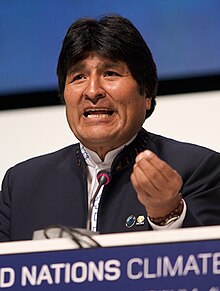Cocalero

Cocaleros are the coca leaf growers of Peru and Bolivia. In response to U.S.-funded attempts to eradicate and fumigate coca crops in the Chapare region of Bolivia, cocaleros joined with other grassroots indigenous organizations in the country, such as unionized mine workers and peasants to contest the government. Evo Morales, who became president of Bolivia in 2006, was a leader of the cocalero movement in that country.[1]
The coca plant and the War on Drugs[]
Coca has been cultivated for 8,000 years by indigenous people in the Andes for medicinal and religious reasons. As a stimulant, it is helpful in overcoming altitude sickness in the high Andes, and can be chewed and made into tea. Other medicinal uses include pain relief, staunching blood flow, combating malaria, ulcers, asthma and improving digestion.[2] It is also configured in many religious ceremonies as offerings to Apus, Inti, and the Pachamama and as a method of divination.
It was introduced to Europe in the 16th century, but it was not until the mid-19th century that it began to be refined into cocaine. Its cultivation was prohibited by Bolivian law, except in the region of Yungas despite its affinity to the climate and land of the Chapare region. Coca crops in Chapare were thus targeted for eradication. Because coca and cocaine were being trafficked up through South and Central America to the United States, coca production in South America came to the attention of the U.S. Drug Enforcement Administration, which, subsequently under Plan Colombia, began to fund eradication efforts across the continent. Plan Colombia sent hundreds of millions of dollars in military aid, training and equipment to Central and South American countries, thereby militarizing the region and local and national governments' responses to coca production. Cocaleros who make their livings growing and selling coca were the most negatively affected by the policies, as their crops were burned, ripped up, or sprayed with herbicide.[3]
Coca producers are left with few alternatives for subsistence, and therefore call for the legalization of coca. Also the anti-drug militancy has targeted left wing guerrilla groups like the Revolutionary Armed Forces of Colombia and gangs who are involved in the drug trade. In 1987, UMOPAR, La Unidad Móvil Policial para Áreas Rurales, was formed as an anti-narcotic counterinsurgency force in Bolivia. It received training and monetary aid from the American Drug Enforcement Administration and led raids on coca fields and suppressed cocalero organizing.[4]
Indigenous organizing in Bolivia[]
Bolivia is a multiethnic, majority indigenous country in South America. Among over three dozen Amerindian nations, the most prominent are the Quechuas, Aymaras, Chiquitanos, Guaranís, and Mojeños. White and mestizo Bolivians have traditionally held power in the country since the time of colonization. For hundreds of years indigenous people were employed by mines that exported the country's mineral wealth abroad, first to Spain and then to other parts of quickly industrializing countries such as the U.S. and Western Europe following independence in 1809.[5]
In the 1980s, the Bolivian Mining Corporation closed many mines, which forced many former miners into coca production. Not only did coca farming provide a living for the ex-miners, but the turn from wage labor to farming allowed for more political organization. Many of the organizations formed during this time period such as the Confederation of Indigenous Peoples of Bolivia later joined forces with the Confederación Sindical Única de Trabajadores Campesinos de Bolivia and the Confederación Sindical de Colonizadores de Bolivia to form the beginnings of the Movimiento al Socialismo, the Party of Evo Morales. Among major mobilizations since its inception, the Confederation of Indigenous Peoples of Bolivia has played a part in marches for land reform, indigenous autonomy, and for a plurinational state.[6]
Cocaleros and the MAS Party[]

Movement for Socialism - Political Instrument for the Sovereignty of the Peoples (In Spanish Movimiento al Socialismo-Instrumento Político por la Soberanía de los Pueblos) or MAS rose as a left-wing populist political organization to support the preservation of the coca plant and the cocalero economy. It grew out of and gained support from the indigenous grassroots organizations that began to coalesce following the closure of mines and the criminalization of the coca plant and indigenous cocaleros.[7]
Carlos Mesa, the president of Bolivia from October 17, 2003 to June 6, 2005, presided over several controversies that mobilized the indigenous grassroots organizations against the government, notably the Bolivian Gas Conflict which drew momentum from the Cochabamba Water Wars. Both of these conflicts centered on disputes between the indigenous population and the government over control of resources. Mesa hastily resigned, opening up the country for elections. The momentum of the MAS party led to the successful election of Evo Morales, a cocalero union organizer, with a 54% absolute majority.[8]
References[]
- ^ Rivera Cusicanqui, Silvia. An Indigenous Commodity and its Paradoxes. ReVista - Harvard Review of Latin America. The President and Fellows of Harvard College. Retrieved 22 June 2015.
- ^ "About Coca leaf". Archived from the original on November 16, 2011. Retrieved December 7, 2011.
- ^ "Plan Colombia, by Noam Chomsky (Excerpted from Rogue States)".
- ^ "The Andean Connection: Tracking the Drug War's Coca Leaves and Failed Policies".
- ^ Hudson, Rex A.; Hanratty, Dennis M., eds. (1989). "Country studies - Bolivia". Washington: GPO. Retrieved 2 March 2020.
{{cite web}}: CS1 maint: url-status (link) - ^ Chávez, Frank (2010-06-25). "69-Year-Old Native Leader Heads 1,500-Km March". IPS. Retrieved 2010-07-08
- ^ Cocalero. Dir. Alejandro Landes. Perf. Evo Morales. 2007.
- ^ "Archived copy" (PDF). Archived from the original (PDF) on 2013-05-13. Retrieved 2011-12-07.
{{cite web}}: CS1 maint: archived copy as title (link)
External links[]
- Coca
- Bolivian society
- Coca in Bolivia
- Drugs in Bolivia
- Indigenous politics in South America